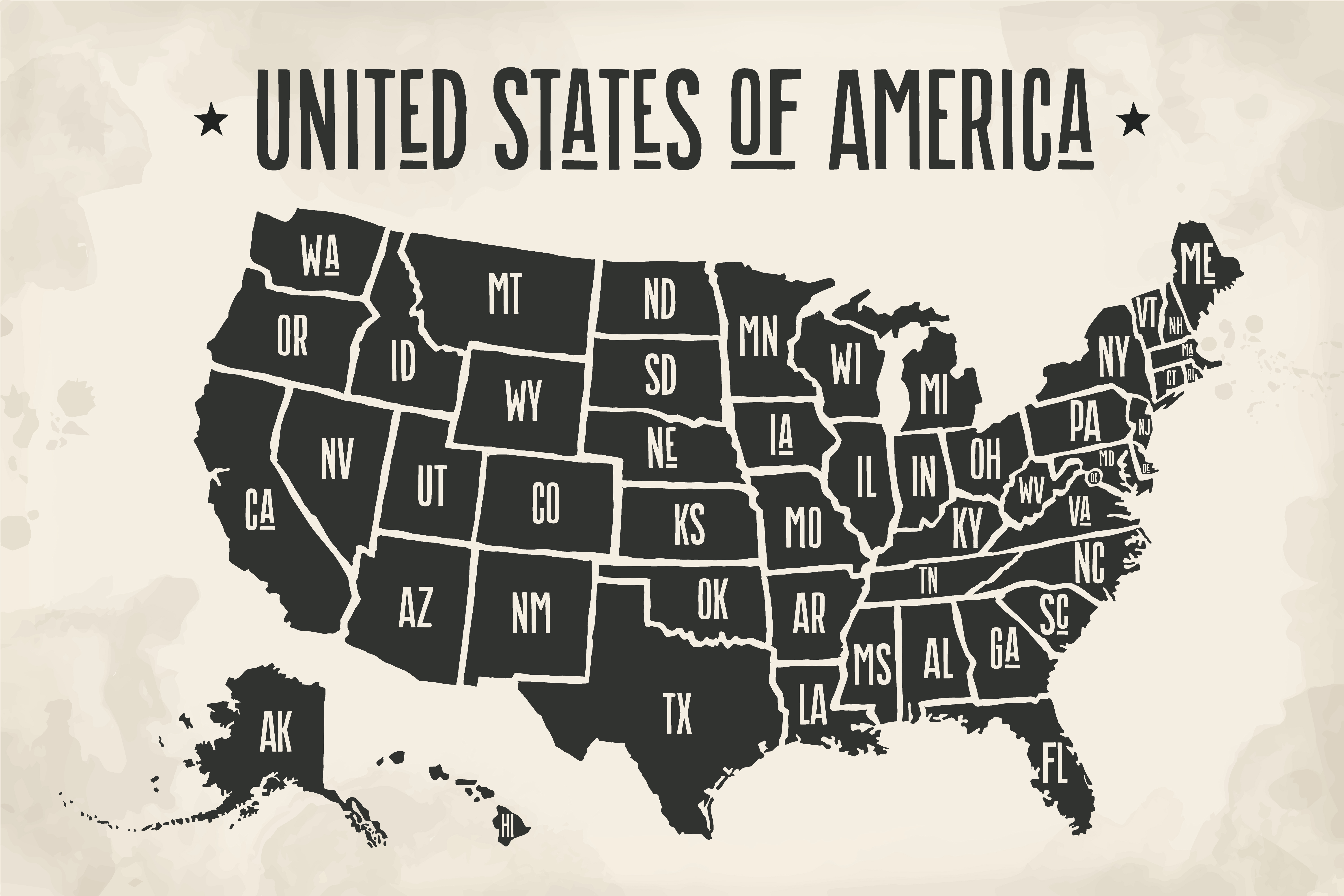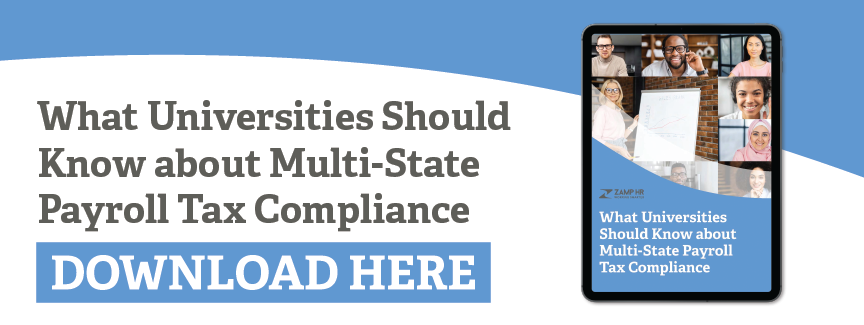The COVID-19 pandemic changed the way America conducts business. Before March 2020 many companies frowned on remote workers. Those same companies changed their minds abruptly and sent employees home to work remotely and safely during the pandemic.
Remote work continues to increase in popularity even as the pandemic appears to wind down to a more manageable level. As a result, more universities and colleges will continue to hire staff that spends some or all of their time at home.
As employers may expect, numerous legal and tax implications flourish when a university staff member lives in a different state than where the university resides. That increasingly popular situation raises the undesirable face of multi-state payroll tax withholding challenges. Universities must resolve most of those challenges before the hiring process begins.
Legal Steps to Take
The topics below describe the legal requirements occasioned by multi-state hiring. You will need to research each state's rules regarding the following issues.
Register to Do Business
Each state has the right to determine the type of information that a business must provide to apply to do business in that state. For example, you most likely will need to get a Certificate of Authority to do business in the state. Some states call this a Foreign Qualification.
It does not matter whether the business is a non-profit, a corporation, or a limited liability company. The Certificate of Authority is the same for each business. The process involved in obtaining that Certificate, however, may vary from state to state. In general, the application for a Certificate of Authority (or a Foreign Qualification) requires:
- The Federal Employer Identification Number, also known as the EIN,
- The Name and Address of the Business,
- Names of the Applicable Owners, Officers, Management, and Directors as well as the Name of the Business's Registered Agent, and
- If a Corporation, information on Shares.
Some states also require a Certificate of Good Standing from the business's home state to accompany the registration application. Businesses usually obtain such certificates from their home state's Secretary of State. You can navigate the process on your own or select a company that provide such a service.
Find a Registered Agent
Businesses that do not maintain a physical presence within a particular state may need to retain a Registered Agent. A Registered Agent accepts correspondence from state agencies and other entities that will only send important documents to an address within the state.
Get Workers' Compensation Insurance
As you probably surmise, rules and taxes regarding Workers' Compensation vary state by state. State-maintained Workers' Compensation programs require businesses to pay taxes to support those programs in every state except Texas. You may obtain additional information on state workers' compensation offices from the Department of Labor's Office of Workers' Compensation, or OWCP.
Research State and City-Specific Hiring Laws
Employment laws vary from state to state, too. States generally have fair hiring laws with which all businesses must comply, so that the hiring process is nondiscriminatory.
States require HR compliance with have rules and regulations regarding:
- Minimum Wages,
- Overtime,
- Paid Leave,
- How often employees must receive their pay,
- Child labor,
- Retaining employment records,
- Using immigration and employment details,
- Lie detector use, and
- Use of information from public records.
"Ban the Box" States.
Thirteen states plus the District of Columbia are known as "ban the box" states. The term refers to the prohibition against asking prospective candidates about their criminal history on their initial employment application.
Some states provide exemptions from the "ban the box" rules for security personnel, or job positions that work with children, elders, and vulnerable adults. Some states require employers to wait until they have conducted an interview or made a job offer to ask about criminal history.
California, for example, requires employers to conduct a complex analysis of whether the employer has justification for including criminal history questions for the particular job sought. If an employer rejects a candidate based on criminal history, it must provide written notice of the decision and an opportunity to provide mitigating evidence.
Tax Implications
Several tax-related implications occur when an employer hires multi-state employees.
A New Nexus
U.S. tax law refers to the state's right to levy taxes against a business that has a presence in the state as the business "nexus." If the answer is yes to even one of the items below, the state has the right to levy taxes on the business. A business has a presence in the state if the business:
- Resides there,
- Has resident employees working in that state,
- Owns property in the state, or,
- Has employees who regularly solicit business within the state.
Another State Tax ID
Hiring employees who live in another state requires the employer to register with that state for a state employer identification number that functions as the state tax ID.
Withholding Changes
With workers who live and work in the same state, the employer withholds income taxes for the state in which the employee works for the university. As a general rule, however, universities who have remote workers, or whose employees cross state lines to work for the university, must withhold income taxes according to the laws of the remote workers' state of residence and the state where the university resides.
Some states, like New York, require employees to pay income tax if they only work one day there. On the other hand, some states state that an employee must work a specified number of days before the employer must withhold taxes for that state.
To avoid double taxation, some states have reciprocity laws that offset taxes with a credit for taxes paid to another state. Other states have reciprocity agreements that only charge taxes according to the employee's state of residence.
Unemployment Taxes
Payroll taxes provide the funding mechanism for state maintained unemployment programs. Therefore, employers need to research the unemployment tax laws with respect to the various states where their employees live and work. If the employer must pay unemployment taxes for a remote worker, then it must apply for workers' compensation accounts for the remote worker's state unemployment tax program.
The Problem with "Do-It-Yourself" Multi-State Payroll
Naturally, it is possible to do all the research and comply with all the necessary multi-state payroll steps yourself. Bear in mind, however, that tax laws and rules and regulations evolve over time. If you want to comply with the laws by yourself, you will need a system that constantly and consistently monitors the various rules and regulations for each state where your employees live and work. There are also federal laws to consider and the modifications to them.
For all practical purposes, most small- to mid-size businesses do not have an expert HR staff large enough to keep up with the research and track all the legislative and regulatory changes that happen every year.
There's a Better Way
The more cost-effective way to handle multi-state payroll withholding is to outsource the process to a nation-wide Professional Employer Organization (PEO). Outsourcing eliminates the bureaucracy because the PEO handles it. The PEO also provides workers' compensation and employee benefits in any state. A PEO makes HR compliance easy for your business.
A nation-wide PEO becomes your outsourcing HR partner, as it shifts some risk from your shoulders. Your outsourcing partner frees you, your managers, and your HR staff to concentrate on growing your business. At the same time, you can rest assured that your tax and labor responsibilities comply with current law.



